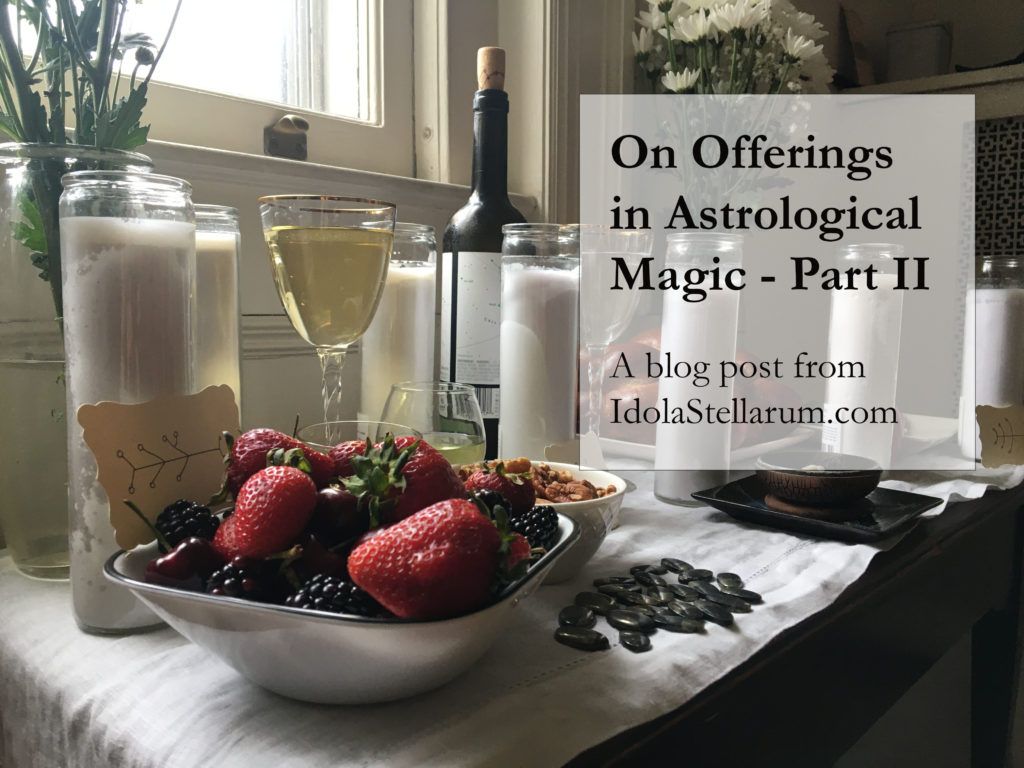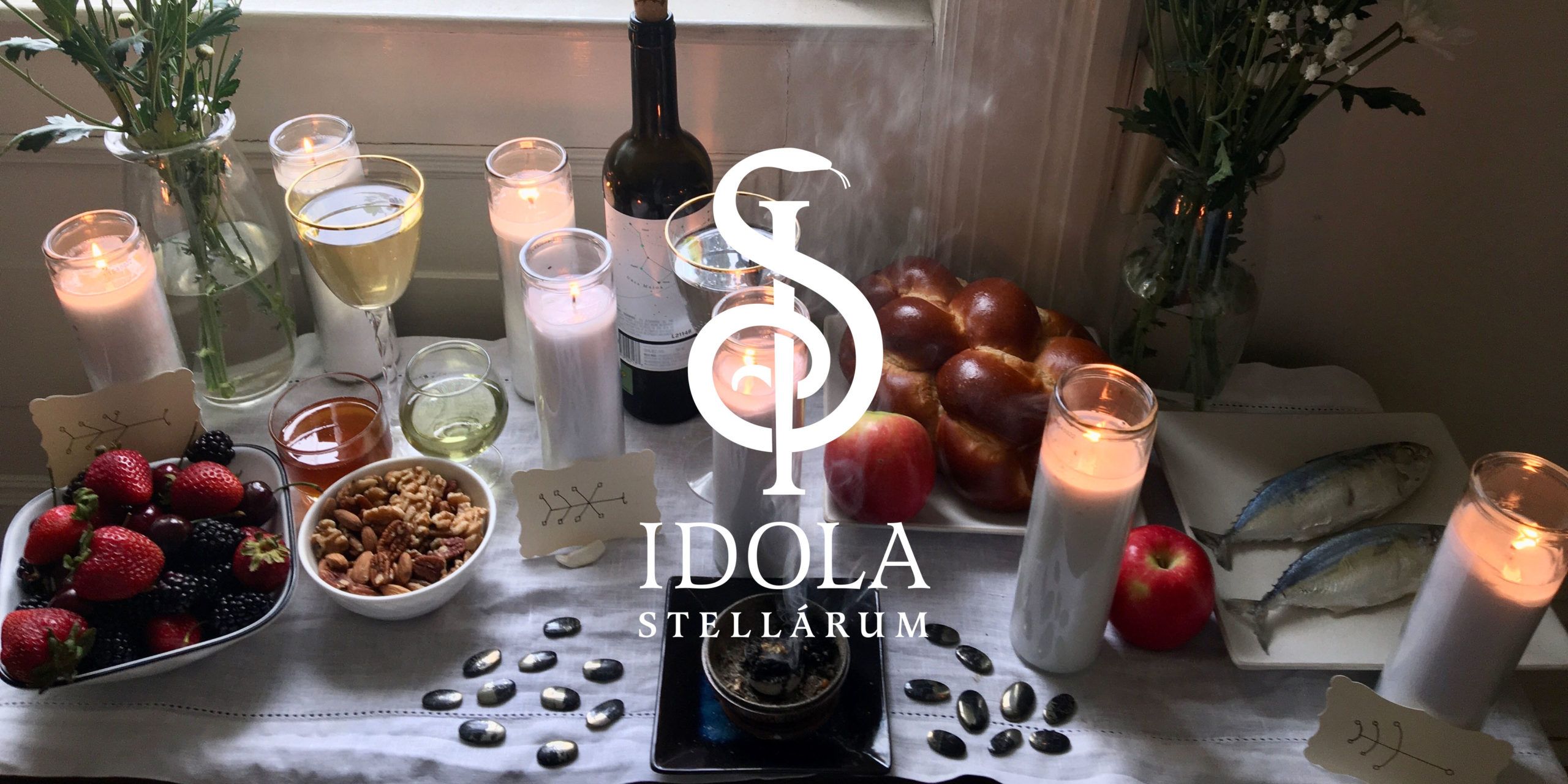In Part I of this series on offerings, we examined historical sources to make two points about the use of offerings in astrological magic. From the example of Albertus Magnus, we saw that making astrological talismans definitely does not require offerings. From other sources more aligned with the devotional, theurgical side of things (Iamblichus, Proclus, and Agrippa), we illustrated how offerings can be seen as part of the tradition of astrological magic, if only an optional part.
In Part II of this post series, we dig deeper into the possible meanings of offerings. Materialist and human-centric viewpoints can easily corrupt how we understand offerings. Rethinking some of these assumptions from a relational perspective can help ground a practice of making offerings in generosity, participation, and respect.
Why Questions About Offerings Arise
In our experience, questions about offerings—whether they are necessary, how to make them, etc.—arise from feelings of discomfort. People may feel uneasy about offerings for many reasons. One might have lingering materialist skepticism about giving corporeal objects to immaterial spirits. One might feel strange about or even resent some perceived pressure to buy or bribe a spirit’s kindness.
Also, one might be sad, embarrassed, or upset about not having the resources to make offerings, or make the ones they might like. One might be squeamish about the perceived politics of offerings: if spirits demand (or humans say that spirits demand) expensive offerings, wouldn’t that make powerful magic off-limits to people without sufficient resources? Finally, one might just think offerings are spurious and do not make the magic more effective.
To address these concerns, we have to think about what assumptions we are making, and rethink what we are actually doing when we make offerings.
Rejecting a Materialist Understanding of Offerings
We reject any dualistic perspective that worries about an unbridgeable gap that makes it unintelligible to make corporeal offerings to incorporeal spirits. All things are full of gods. They are right here, not somewhere out there apart from the world. As the scholar Gregory Shaw explains Iamblichus’ perspective on theurgy:
“[A]s Iamblichus puts it, ‘it is impossible to participate individual in the universal orders, but only in communion with the divine choir of those lifted up together, united in mind.’ … [Theurgy involves] a radically non-dual vision that sees the physical world as radiantly transformed, not rejected or denied in favor of a ‘spiritual’ reality.”
—Gregory Shaw, Theurgy and the Soul, pp. xx-xi, emphasis original
For related reasons, we consider it mistaken to think of ourselves as taking something that is ours that we own at a human scale and offering it as a gift or a treat to a separate celestial being. This way of thinking views offerings as transactional, with the mage trying to buy or bribe power from a celestial being.
Framing offerings in a transactional way exposes the disconnectedness and materialist assumptions in this viewpoint. Within the astrological magical tradition, any animal, plant, or stone possesses virtues of one or more celestial spirits. Offerings would only make sense within a transactional model if we thought of celestial virtues as somehow becoming scattered and separated from the celestial spirits. Making an offering would be somewhat like returning a lost wallet, as if we were saying, “Here, spirits, you dropped this—I’d be willing to give it back, if you would only do us a favor in return.”
The way we see it, however, the gifts of the celestials are already theirs: the animals, plants, and minerals of Saturn or the Sun are not things down here that Saturn or the Sun might need or enjoy, but exist as Saturnine and Solar nature, perfectly though partially expressed or instantiated. If saffron is solar, doesn’t it already belong with the Sun? If cumin belongs with Saturn, why would Saturn need or want us to give cumin back to them? Exalting the sublunary realm as divine in-and-of-itself and always full of gods and spirits means reckoning with the ways we tend to divide what already exists in unity.
Relationally Rethinking Offerings
The cunning man and historian of magic Dr. Alexander Cummins once remarked that the Prayer of the Gnomes is not a prayer to the gnomes or a gnomelike prayer. Rather, the Prayer of the Gnomes is the prayer that the gnomes pray. Thus, to recite the prayer is to pray as the gnomes pray, or to pray with the gnomes. This insight provides a key for rethinking the metaphysics of offerings.
When we collect offerings to Saturn or Sol, we are collecting Saturn and Sol, full stop. In doing so, we join our here-and-now ritual agency with their then-and-there generative agency that once scattered and continually scatters their natures far and wide among the terrestrial spirits who join with them.
Just as in reciting the Prayer of the Gnomes we are praying with the gnomes, when we make offerings to the celestials, we are not giving them gifts. When we make offerings, we are making offerings as the celestials make offerings.
Within our ecological spirit model, we consider offerings as participatory, not transactional. Offerings are not a one-sided bribe or gift out of nowhere: rather, offerings embody mutual relationship with the celestial spirits. We are offering with the celestials, not to the celestials.
Making Offerings Relative to Your Resources
This model allows us to relationally rethink the meaning of offerings in a way that takes into account the mage’s position, class, and resources.
To begin, we should notice that the celestial spirits and angels generate gifts here on earth through their virtually limitless generosity. The powers of generation and corruption in the celestial spheres extend vastly beyond our own.
Within a relational view of the cosmic chain of being, we have to recognize that each type of being and each individual of each type of being plays a particular role in creation. Every being fits just right. Certainly, then, creation must apportion to each according to their celestial need, and demand from each according to their celestial ability.
This perspective makes clear that we cannot expect the limitless generosity of the celestial spirits from ourselves. We have to consider our position and capacity. Therefore, when we in our limited nature make offerings with the spirits, we should offer in accordance with our own potential for generosity.
That means: if you find yourself well-resourced, you are positioned to make offerings in accordance with your resources. If you are not well-resourced, smaller or more modest offerings may have the same or even greater meaning than a luxurious offering coming from someone more well-off. For us, offerings are all about relationship. If all you have is water, offer water. If you can comfortably afford good wine, offer good wine. Overextending oneself is not generosity: it is self-exploitation. Denigrating someone else’s modest offering is not celestial magnanimity: it is human cruelty.
The Ritual Context of Offerings
Finally, we can take another look at the magical purpose of offerings. At Idola Stellarum, we look at this two ways. First, every talismanic working we perform is also a theurgic rite. Astrological talismans themselves situate their bearers within the celestial spheres and attune to the spirit hierarchy that the talismanic spirit lives within. Similarly, the ritual process of making talismans situates the mage within this hierarchy, and we leverage that ritual process to deepen our connection to the celestial spirits. Ritual offerings serve this theurgic purpose, as we explained in Part I of this post series.
Second, we also believe that offerings play a magical role in the talismanic ritual. In their works on astrological magic, both Agrippa and Ficino refer to gathering or collecting various objects (stones, herbs, foods, animals, etc.) belonging with a particular celestial hierarchy. We can use the analogy of a lens to think about the role of this collection. The relevant celestial rays are already present simply by virtue of astrological timing. Just like a lens focuses and magnifies light, the collection of offerings and other objects relevant to a particular entity serve to further gather, enhance, or magnify the effects of the talismanic rite.
From another perspective, we can consider that in any given moment, various spirits are present. In any moment, all of the planetary spirits are active in some way; in any given planetary hour, one particular planetary hierarchy is highlighted, and another hierarchy may be by virtue of the planetary day. Sources such as the Heptameron speak of spirits of the four seasons. The Shams Al Ma’arif and other sources reference the spirits of the mansion of the Moon. The skill of the mage is to discern and select a particular spirit hierarchy from the many that are always present. Various features of the rite serve this purpose—including offerings.
Additionally, the external form of the ritual also has an effect on the mage, helping to focus them, both psychologically and spiritually. If offerings fit into your aesthetic, they can play a personal role in this fashion as well to situate you as the mage more strongly within the ritual time, space, and mood.
Our Offerings
As we said in Part I of this post series, there is no One True astrological magic. It is up to every practitioner to come into intentional, personal relationship with the tradition and develop their own understanding. At Idola Stellarum, we focus on relationships. Our values show through our practice. We hope that reading about our perspective on offerings gives you a sense of how we think about ourselves in relationship to the celestial spirits. Ideally, this helps you clarify your own thinking and relationship as well.
As stewards of the tradition of astrological magic, it is our privilege to bring the wonder of astrological talismans to others. Sign up to our mailing list for word of our upcoming talismanic collections and workings:
By clicking ‘subscribe’, I consent to Idola Stellarum storing my email and information solely for the purpose of communicating upcoming offerings and content, and I am able to unsubscribe at anytime.


